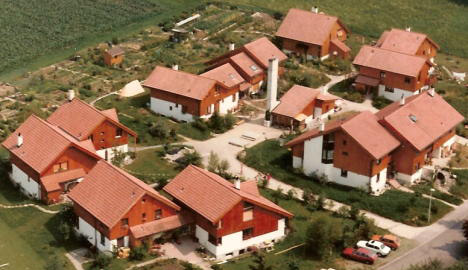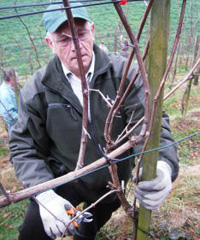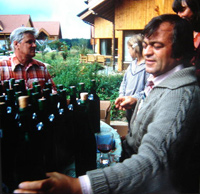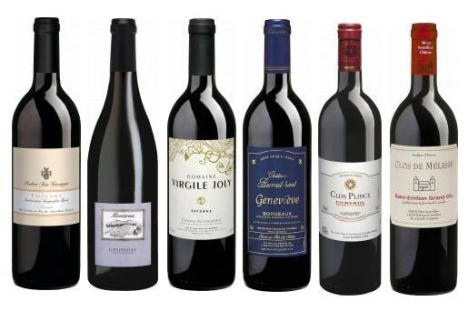We are in the Rhône Valley at a wine presentation of the "Découvertes en Valée du Rhône". Wine Nose" rushes up to me with a glass in his hand: "Peter, smell this! I try my nose, then my palate. The wine tastes different! But how? It was then - about four years ago - that the thought first occurred to me: Organic wines could taste different, because what Christian ("wine nose") chose from the huge range is an organic wine.
 |
| "Biodorf"% an "organic" settlement% built 30 years ago270 |
I had long forgotten about this little episode when the question arose in the forum: "do organic wines really have to taste different"? The discussion is initiated, but only a few take part in it. Organic wines are - at least for "wine connoisseurs" - obviously not a topic (anymore).
And again I remember, it was far more years ago, when my friend (a Burgundy connoisseur) categorically declared: "Organic wines are not wines!" He could recognise them "blindly". In fact, at the next Bordeaux tasting, I smuggled in an organic wine as a pirate. He was unmasked immediately.
 |
| The vine consultant shows pests on the vines |
In the meantime, the label "organic" has become marketable. The content is still blurred, but it is an effective short and universal term for different things: close to nature, ecological, poison-free, anthroposophical, healthy, better.....
Wine magazines and trade journals have also taken up the topic. Nowhere have I met so many winegrowers who claim to work "organically" as in France.
What "organic" means remains open to definition. The interpretation ranges from the much-cited moon phase to large-scale industrial organic production.
A good 30 years ago, we - 12 families and a self-confessed anthroposophical architect - built an "organic village". At that time - after the concrete phase - "building biology" came along, and we were considered pioneers, building our houses faithfully according to the ideas of Hubert Palm, the father of biological building. I have now lived in this house for almost thirty years. Am I living better?
I live well. But better?
 |
| Wine bottling in the organic village |
At an instruction session, the regional vine consultant explains to us how to prune the vines in winter. He also shows us shoots with scale, black spot and black red: they have to be treated with oil preparations and fungicides. Immediately the discussion starts. Are there alternatives? Names of organic products are also mentioned. The vine expert shakes his head.
One senses that he doesn't think much of "organic", but he pleads: "Please only treat the affected areas, don't spray the whole vineyard with poisons. Otherwise too many beneficial insects will be affected. This is no rapprochement with the Greens and no genuflection to the biophantasts, this is simply common sense!" Poing, it sits.
Again I remember my own "approach" to the organic philosophy of our organic village. I did not find the encounter easy - even today I am considered (almost) unteachable. After replacing my small lettuce seedlings in the organic garden for the fifth time (20 cents each), the "forbidden" slug pellets have found their way into my garden, nicely hidden under lush ornamental flowers. Even television, with all its harmful rays, was granted to me at that time (due to my job), and my vice (wine) produced at best a pitying smile. But when I started bottling wine on our terrace from a natural wooden cask, using natural corks, I was forgiven for my vice. I am rehabilitated - at least in terms of wine.
 |
| Hans-Ulrich Kesselring% a sensitised Swiss top winemaker |
And my winemaker contacts. Among them is a high-profile Swiss winemaker, Hans-Ulrich Kesselring. His image: a tinkerer and analyst who, in his in-house laboratory - which would do credit even to a Michel Rolland - analyses everything that could make wine good, even better: Soil, plants, natural products, beneficial insects, etc. In the vineyard and in the cellar, he acts accordingly. In many ways, Kesselring is the "counter-example" of an organic farmer. But this winegrower from eastern Switzerland attended a course on organic viticulture that lasted several days. He openly admits that he still has his difficulties with the phases of the moon, cow horns and homeopathic doses: "I sit here as a doubter, not because I believe nothing, but because I think everything is possible." He uses this Thomas Mann quote to describe his feeling after 4 days of biodynamics. "So I had an anthroposophist calculate the best and the worst time to plant this spring. In 5 blocks of 10 each, we planted identical vines at the two times and wait with anticipation to see how they will grow under different stars! I noticed an unexpected change in myself: suddenly it's easier for me to spend money on compost than on a new tractor."
Such thoughts almost amount to a "conversion". Conversion? In fact, the organic idea quickly has something to do with religion, especially when the "sole saint" claim and a conversion are associated with it. Almost every "conversion" entails some kind of war, a holy war, and where there is war, the Inquisition is not far away.
But do I know now whether organic wines taste different?
Youthful sin of a boy brought up strictly Catholic: as altar boys we tasted Mass wine whenever possible, before the consecration of course, i.e. when the wine is still wine and not "blood of Christ". Even then, curious as I am, I wanted to know whether the wine tastes different after the consecration. It was not until many years later, after Vatican II, that I received an answer. Now, from time to time, the laity is not only served bread (wafer) in church, but also a chalice with wine. My boundless disappointment: it tasted no different.... and yet it is - according to the teachings of the church - different, no longer just wine, but....
 |
| Offer of "organic wines" in the speciality shop |
Since this primal experience, I have also lived at peace with organic wine. I do try to find out from time to time whether it really "tastes different". I taste two wines, compare one from "organic" cultivation and one from "conventional" cultivation. Sure, they are different. They are different. But they are not the same wines either: different terroir, different vinification, different vines.... Just as two conventionally vinified wines are always different if they do not come from the same barrel, the same vintage or from the same winemaker. Only this is not called "biodifference"!
Cordially
Yours/Yours
Peter (Züllig)